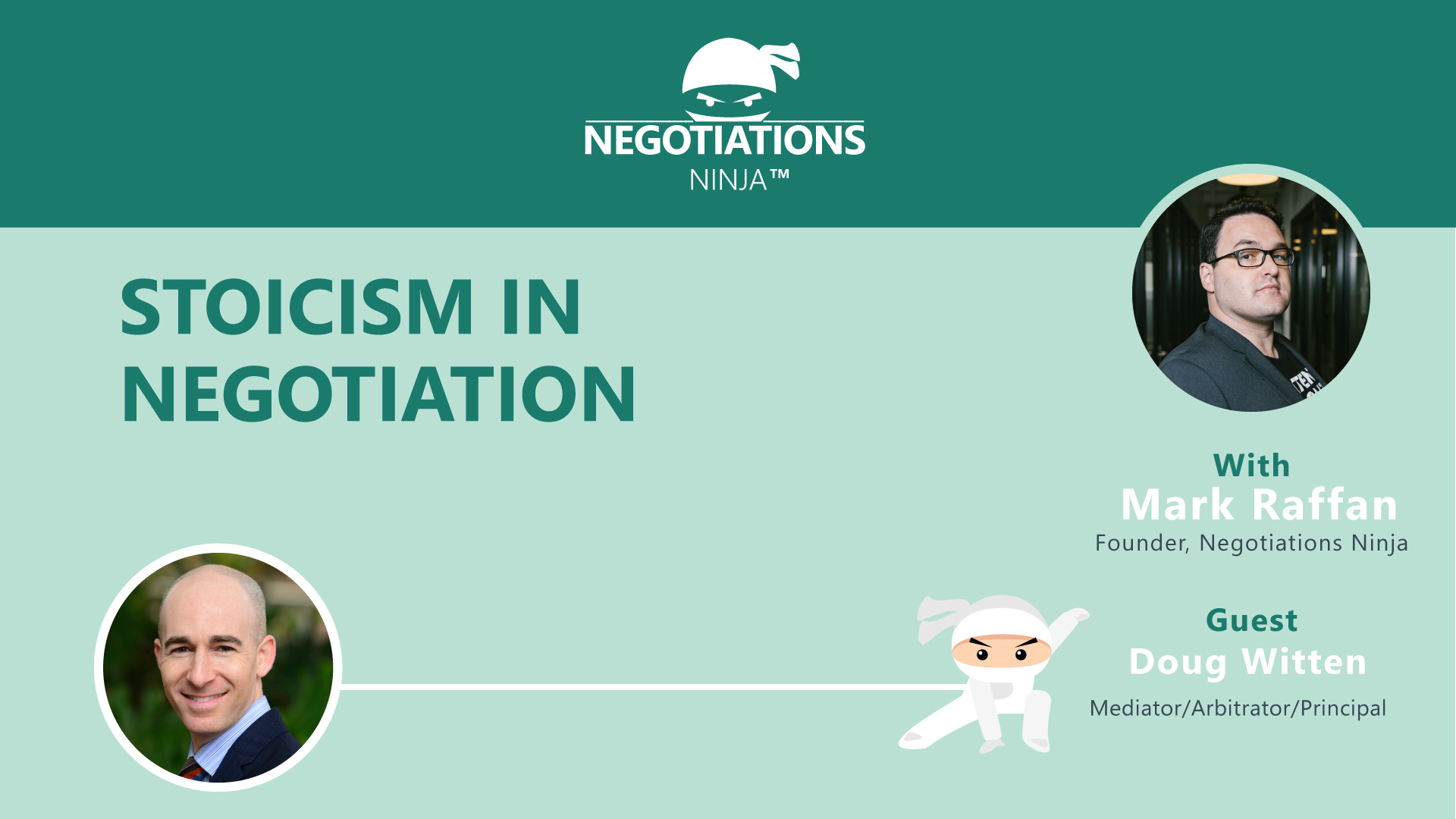What is stoicism? What is its background and context? How can the philosophical lessons of stoicism be applied to negotiation? According to Doug Witten, there are many lessons we can learn from famous stoics that we can apply to negotiation.
Doug Witten is a mediator, arbitrator, negotiation coach, author, and was previously a corporate lawyer. He made it the mission of his career to help businesses and individuals solve disputes via alternative means. He’s been guiding people through the negotiation process as a neutral party since 2003.
Outline of This Episode
- [1:55] Learn more about Doug Witten
- [3:06] Why stoicism in negotiation?
- [4:52] What negotiators can learn from stoicism
- [6:43] The dichotomy of control
- [8:33] The use of emotion in stoicism and negotiation
- [13:06] How to remain objective in negotiations
- [16:42] Embracing humility in negotiation
- [21:00] The application of empathy in negotiation
What is stoicism?
Stoicism is a Grego-Roman branch of ancient philosophy designed to help people be more resilient, virtuous, and wise. It’s seen a resurgence in popular culture. Some of the most famous stoics included Marcus Aurelius (a Roman Emperor in the 2nd Century), Epictetus (a former slave), and Seneca (a playwright and political advisor).
Stoicism emphasizes self-mastery, perseverance, and wisdom, promotes keeping a calm mind, and promotes strength and stamina. Doug points out that it’s practical and can be broken down into usable concepts. It’s more accessible than theoretical.
What negotiators can learn from stoicism
Doug was initially drawn to stoicism because it helps build mental toughness. And as an attorney, entrepreneur, and long-distance runner, stoicism spoke to him. It helped him stay grounded. He believes stoicism makes him a better person. Some key concepts directly relate to negotiation.
Our reliance on technology will place a premium on a negotiator’s ability to master the basics of managing one’s emotions, controlling your ego, and dealing with interpersonal relationships. As long as humans are involved in conflict and decision-making, stoicism can give you a leg up.
The use of emotion in stoicism and negotiation
People don’t always make logical decisions in negotiations. Logical and linear legal arguments don’t always win. When tempers flare, people get angry, upset, hurt, embarrassed, and communication breaks down. It’s difficult to make good decisions when we’re overtaken by emotions.
Managing, regulating, and channeling emotion is a bedrock principle of stoicism. The philosopher Athenodorus gave some advice to the Emperor, Octavian. He said, “When you get angry before you respond, repeat the alphabet to yourself.”
Epictetus said, “If someone succeeds in provoking you, realize that your mind is complicit in the provocation.” That’s where training in stoic practice comes into play. You have to be still and unshaken.
The first step is to catch yourself, be aware of your anger, and identify it. Then, you have to stop and assess your options. How can you turn an obstacle into something that can be used positively?
You have to figure out what works for you. Is it counting to 10? Is it exercise? What will give you the time to process your emotions?
If you’re stuck in traffic and frustrated at your slow progress, maybe you can listen to a podcast, make a phone call, etc. Take that situation and turn it into something positive. The goal is to avoid reacting.
The dichotomy of control
There are things that we can’t control. But we can control our thoughts, beliefs, opinions, and actions. Good things and bad things happen. You may not be able to control what happens but you can control how you respond. Your power lies in that choice. You can train your mind to do the right thing. Learn more about stoicism in negotiation in this episode of Negotiations Ninja.
Resources & People Mentioned
Connect with Doug Witten
- The Stoic Negotiator™
- Innovative ADR
- Connect on LinkedIn
- Follow on Twitter
Connect With Mark
- Follow Negotiations Ninja on Twitter: @NegotiationPod
- Connect with Mark on LinkedIn
- Follow Negotiations Ninja on LinkedIn
- Connect on Instagram: @NegotiationPod




